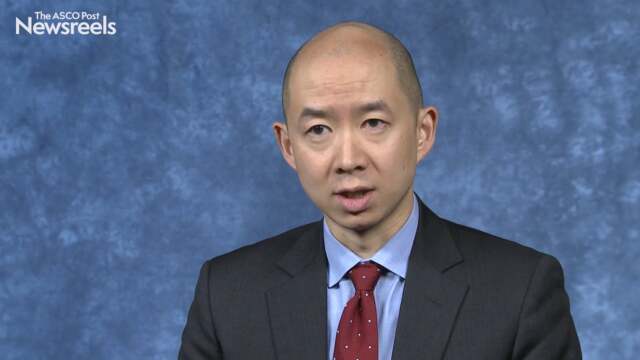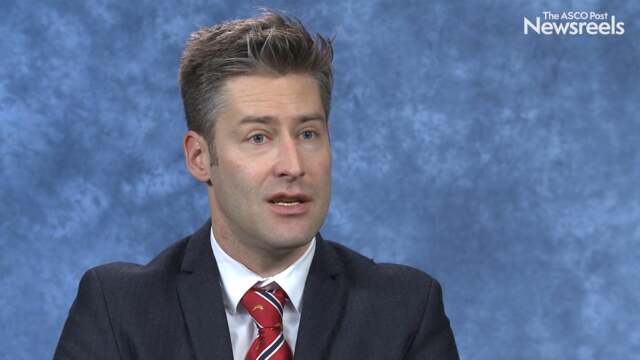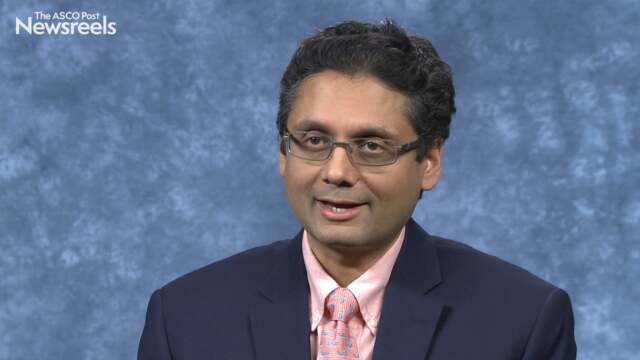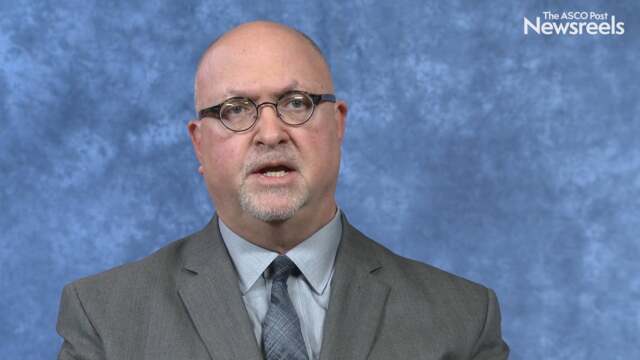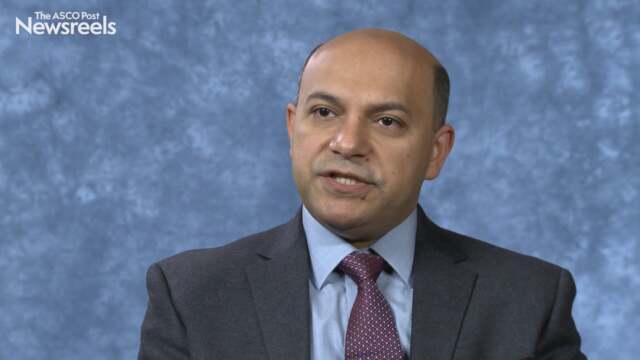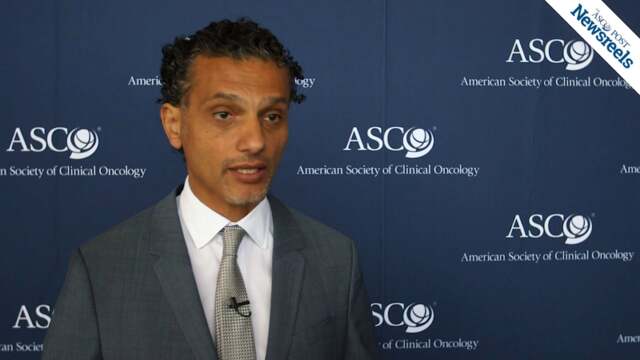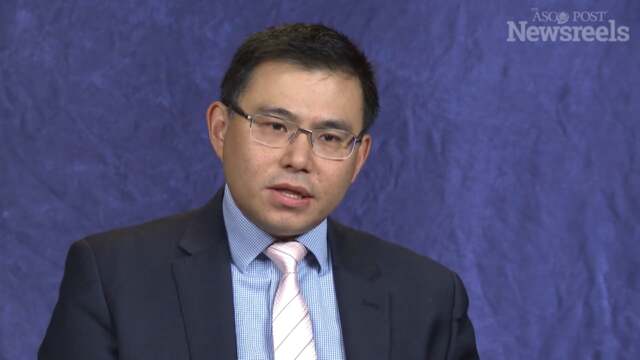Neoadjuvant Chemoradiotherapy in Locally Advanced Esophageal Cancer
In a Chinese phase III trial reported in the Journal of Clinical Oncology, Yang et al found that adding neoadjuvant chemoradiotherapy to surgery improved survival in locally advanced squamous cell carcinoma of the esophagus. Study Details In the open-label trial, 451 patients with potentially...
European Commission Approves Trastuzumab Biosimilar
The European Commission (EC) has approved Trazimera, a biosimilar to trastuzumab (Herceptin), for the treatment of human epidermal growth factor (HER2)–overexpressing breast cancer and HER2-overexpressing metastatic gastric or gastroesophageal junction adenocarcinoma. This approval...
Second-Line Pembrolizumab vs Paclitaxel in Advanced Gastric or Gastroesophageal Junction Cancer
As reported in The Lancet by Shitara et al, the phase III KEYNOTE-061 trial showed no significant overall survival benefit with pembrolizumab vs paclitaxel in patients with advanced gastric or gastroesophageal junction cancer progressing on platinum-fluoropyrimidine treatment with programmed cell...
2018 ASCO: Esomeprazole With Aspirin Offers Moderate Benefits in Patients With Barrett’s Esophagus
An updated analysis of a randomized phase III trial showed that taking a high dose of the acid-reducing medicine esomeprazole with low-dose aspirin for at least 7 years can moderately reduce the risk of developing high-grade dysplasia or esophageal cancer and delay death from any cause in people...
ESTRO 37: Positioning for Radiotherapy and Impact on Survival in Patients With Lung or Esophageal Cancers
Very small differences in the way a patient lies during radiotherapy treatment for lung or esophageal cancer can have an impact on survival, according to research presented at the European Society for Radiotherapy & Oncology (ESTRO) 37 Conference (Abstract OC-0322). These differences of only a...
Postoperative Chemotherapy vs Chemoradiotherapy in Resectable Gastric Cancer
In the Scandinavian phase III CRITICS trial reported in The Lancet Oncology, Cats et al found no benefit of postoperative chemoradiotherapy vs chemotherapy among patients with gastric cancer who had received neoadjuvant chemotherapy. Compliance with postoperative regimens was poor in both groups....
Anti–PD-1 Immunotherapy in Previously Treated Gastric Cancer
As reported in JAMA Oncology by Fuchs et al, pembrolizumab (Keytruda) showed activity in patients with previously treated advanced gastric and gastroesophageal junction cancer in the phase II KEYNOTE-059 trial. Study Details In the study, 259 patients from sites in 16 countries who had disease...
Possible Link Between Drinking Hot Tea and Increased Chance of Esophageal Cancer in High-Risk Individuals
Esophageal cancer is the eighth most common cancer worldwide, with an estimated 456,000 new cases in 2012, and the sixth most common cause of death from cancer with an estimated 400,000 deaths, according to data from GLOBOCAN, which provides statistics on the incidence and mortality of cancer...
Patient Refusal of Esophagectomy and Long-Term Survival
Patients with esophageal cancer who refuse surgery when it is recommended are less likely to survive long term than similar groups of patients who undergo an operation, according to research presented by Ghaly et al at the 54th Annual Meeting of The Society of Thoracic Surgeons (P78). ...
Detecting and Localizing Eight Cancer Types With One Multianalyte Blood Test
Johns Hopkins Kimmel Cancer Center researchers developed a single blood test that screens for eight common cancer types and also helps identify the location of the cancer. The test, called CancerSEEK, is a unique noninvasive, multianalyte test that simultaneously evaluates levels of eight cancer...
Abraham J. Wu, MD, on Esophageal Cancer: Impact of Lung and Heart Dose on Survival After Radiotherapy
Abraham J. Wu, MD, of Memorial Sloan Kettering Cancer Center, discusses his findings that suggest efforts to reduce lung dose, such as shrinking the treatment volumes or using proton therapy, may improve outcomes in esophageal cancer (Abstract 3).
Maria Svensson, MD, PhD Candidate, on Esophageal and Gastric Cancers: Significance of PD-1 and PD-L1 Expression
Maria Svensson, MD, PhD Candidate, of Lund University, discusses high expression of PD-1 and PD-L1 in chemotherapy-naive esophageal and gastric adenocarcinomas, the implications for survival, and the link to a deficiency in mismatched repair genes (Abstract 9).
Pieter van der Sluis, MD, PhD, on Esophageal Cancer: Results From a Surgical Treatment Trial
Pieter van der Sluis, MD, PhD, of the University Medical Center Utrecht, discusses study findings that compared robot-assisted minimally invasive thoracolaparoscopic esophagectomy vs open transthoracic esophagectomy for resectable esophageal cancer (Abstract 6).
Manish A. Shah, MD, on Gastric Cancer: Results From the RAINFALL Trial
Manish A. Shah, MD, of Weill Cornell Medicine, discusses phase III study findings on cisplatin plus capecitabine or fluorouracil with or without ramucirumab as first-line therapy in patients with metastatic gastric or gastroesophageal junction adenocarcinoma (Abstract 5).
David H. Ilson, MD, PhD, on Improving Esophageal Cancer Outcomes: Future Directions
David H. Ilson, MD, PhD, of Memorial Sloan Kettering Cancer Center, discusses the merits of preoperative chemotherapy vs chemoradiotherapy, the role of targeted agents, recent results from genomic profiling, and whether PET scans can guide neoadjuvant treatment.
Basem Azab, MD, on Esophageal Cancer: Study Survival Results
Basem Azab, MD, of the Sylvester Comprehensive Cancer Center, University of Miami, discusses the impact on overall survival when more than 2 months elapse between finishing neoadjuvant therapy and undergoing esophagectomy (Abstract 2).
Reports From the Journal of Clinical Oncology
Immunotherapy in PD-L1–Positive Advanced Cervical Cancer Pembrolizumab (Keytruda) treatment was active in patients with programmed cell death ligand 1 (PD-L1)–positive advanced cervical cancer enrolled in the phase Ib KEYNOTE-028 trial. The findings were reported by Jean-Sebastien Frenel, MD, of...
Updated Data in KEYNOTE-061: Pembrolizumab in Previously Treated Gastric or Gastroesophageal Junction Adenocarcinoma
The phase III KEYNOTE-061 trial investigating pembrolizumab (Keytruda) as a second-line treatment for patients with advanced gastric or gastroesophageal junction (GEJ) adenocarcinoma did not meet its primary endpoint of overall survival (OS) (hazard ratio [HR] = 0.82, 95% confidence interval [CI] = ...
Oral Microbiota Indicates Possible Link Between Periodontal Disease and Esophageal Cancer
An analysis of bacteria present in the mouth showed that some types of bacteria that lead to periodontal disease were associated with higher risk of esophageal cancer, according to a study published by Peters et al in Cancer Research. Esophageal cancer is the eighth most common cancer and the...
FDA Approves Biosimilar for the Treatment of Certain Breast and Stomach Cancers
The U.S. Food and Drug Administration (FDA) today approved trastuzumab-dkst (Ogivri) as a biosimilar to trastuzumab (Herceptin) for the treatment of patients with breast or metastatic gastric or gastroesophageal junction adenocarcinoma whose tumors overexpress the HER2 gene. The drug is the first...
Update on Phase III JAVELIN Gastric 300 Trial of Avelumab in Pretreated Advanced Gastric Cancer
On November 28, Merck KGaA and Pfizer announced that the phase III JAVELIN Gastric 300 trial did not meet its primary endpoint of superior overall survival with single-agent avelumab (Bavencio) compared with physician's choice of chemotherapy. The trial investigated avelumab as a third-line...
Quality of Life With Neoadjuvant Chemoradiotherapy in Esophageal/Esophagogastric Junction Cancer
An analysis in the Dutch Chemoradiotherapy for Esophageal Cancer Followed by Surgery Study (CROSS) reported by Noordman et al in the Journal of Clinical Oncology showed no adverse effect of neoadjuvant chemoradiotherapy vs surgery alone on postsurgery health-related quality of life in patients with ...
Immunotherapy in Advanced Esophageal Carcinoma
As reported in the Journal of Clinical Oncology by Doi et al, pembrolizumab (Keytruda) showed activity in patients with previously treated advanced esophageal carcinoma in the phase Ib multicohort KEYNOTE-028 study. Study Details In the study, eligible patients with squamous cell carcinoma or...
Metastatic Gastric Cancer: Dual HER2-Targeting Study Does Not Meet Primary Endpoint
Dual HER2 targeting in metastatic gastric and gastroesophageal junction cancers did not significantly improve outcomes over trastuzumab (Herceptin) alone—both in combination with chemotherapy—according to the results of the phase III JACOB study reported at the 2017 European Society for Medical...
Adjuvant Chemotherapy vs Observation After Preoperative Chemoradiotherapy and Resection in Gastroesophageal Cancer
In a propensity score–matched analysis reported in JAMA Oncology, Mokdad et al found that adjuvant chemotherapy had a survival benefit vs observation after preoperative chemoradiotherapy and resection in patients with locally advanced gastroesophageal cancer. Study Details The study...
Addition of Cetuximab to Concurrent Chemoradiation in Esophageal Cancer
The phase III NRG Oncology RTOG 0436 trial has shown no survival benefit of adding cetuximab (Erbitux) to paclitaxel/cisplatin and radiation therapy in patients with esophageal cancer treated without surgery. These results were reported by Mohan Suntharalingam, MD, MBA, of the Marlene and Stewart...
FDA Grants Accelerated Approval to Pembrolizumab for Advanced Gastric Cancer
On September 22, 2017, the U.S. Food and Drug Administration (FDA) granted accelerated approval to pembrolizumab (Keytruda) for patients with recurrent locally advanced or metastatic, gastric or gastroesophageal junction adenocarcinoma whose tumors express programmed cell death ligand 1 (PD-L1) as ...
FDA Approves First Biosimilar for the Treatment of Cancer
The U.S. Food and Drug Administration today approved bevacizumab-awwb (Mvasi) as a biosimilar to bevacizumab (Avastin) for the treatment of multiple types of cancer. Bevacizumab-awwb is the first biosimilar approved in the U.S. for the treatment of cancer. “Bringing new biosimilars to...
ESMO 2017: New Data Confirms Superiority of Docetaxel-Based Triplet Therapy in Esophagogastric Cancer
The superiority of docetaxel-based triplet therapy over standard of care in patients with resectable esophagogastric cancer has been confirmed in late-breaking results from the FLOT4 trial presented at the European Society for Medical Oncology (ESMO) 2017 Congress in Madrid (Abstract LBA27_PR)....
ESMO 2017: MIRO Trial: 3-Year Outcomes Favor Laparoscopic Surgery for Esophageal Cancer
Patients requiring surgery for esophageal cancer fare better after undergoing a hybrid minimally invasive esophagostomy compared to an open esophagostomy, according to long-term results of the MIRO trial presented at the European Society for Medical Oncology (ESMO) 2017 Congress in Madrid (Abstract ...
Women More Likely Than Men to Experience Response After Induction Chemoradiotherapy and Esophagogastrectomy for Esophageal Cancer
Female patients with locally advanced esophageal cancer treated with chemotherapy and radiation therapy before surgery are more likely to have a favorable response to the treatment than male patients are, and women are less likely to experience cancer recurrence, according to a study published by...
Prolonged and Intensified Neoadjuvant Therapy for Esophageal Adenocarcinoma
A UK phase III trial (UK MRC OE05) has shown no significant survival benefit of extended and intensified neoadjuvant chemotherapy with epirubicin, cisplatin, and capecitabine vs standard cisplatin/fluorouracil followed by resection in patients with esophageal adenocarcinoma. The findings were...
Addition of Cetuximab to Concurrent Chemoradiation in Esophageal Cancer
The phase III NRG Oncology RTOG 0436 trial has shown no survival benefit of adding cetuximab (Erbitux) to paclitaxel/cisplatin and radiation therapy in patients with esophageal cancer treated without surgery. These results were reported by Suntharalingam et al in JAMA Oncology. Study Details In...
High-Dose First-Line Trastuzumab Maintenance in Metastatic HER2-Positive Gastric Cancer
As reported in the Journal of Clinical Oncology by Shah et al, the phase IIIB HELOISE trial has shown no survival benefit of high-dose vs standard trastuzumab (Herceptin) maintenance plus chemotherapy in the first-line treatment of metastatic gastric or gastroesophageal junction adenocarcinoma....
Association of EGFR Copy Number Gain and Outcome With Gefitinib in Advanced Esophageal Cancer
As reported by Petty et al in the Journal of Clinical Oncology, analysis of outcomes in the UK phase III Cancer Esophagus Gefitinib trial showed an overall survival benefit with second-line gefitinib (Iressa) in patients with advanced esophageal cancer who had epidermal growth factor receptor...
Salah-Eddin Al-Batran, MD, on GEJ Adenocarcinoma: Results From the FLOT4-AIO Trial
Salah-Eddin Al-Batran, MD, of the Institute of Clinical Cancer Research Krankenhaus Nordwest, discusses phase III study findings on perioperative chemotherapy with docetaxel, oxaliplatin, and fluorouracil/leucovorin vs epirubicin, cisplatin, and fluorouracil or capecitabine for resectable gastric or gastroesophageal junction adenocarcinoma. (Abstract 4004)
FDA Grants Priority Review to sBLA for Pembrolizumab in Recurrent or Advanced Gastric or GEJ Adenocarcinoma
The U.S. Food and Drug Administration (FDA) has accepted for review a supplemental Biologics License Application (sBLA) for pembrolizumab (Keytruda) seeking approval for treatment of patients with recurrent or advanced gastric or gastroesophageal junction (GEJ) adenocarcinoma who have already...
Hypofractionated Radiotherapy vs Conventionally Fractionated Radiotherapy in Early-Stage Glottic Cancer
Radiotherapy alone is often used to treat early-stage glottic cancer. However, the optimal radiation treatment schedule remains unknown. Both hypofractionated radiotherapy and conventionally fractionated radiotherapy are recommended treatment options. In an attempt to compare differences in overall ...
More on Treatment Decisions in Esophageal Cancer
In the March 25, 2017, issue of The ASCO Post, Steven H. Lin, MD, PhD, shared his thoughts on the role of positron-emission tomography (PET) in assessing response to induction chemotherapy in patients with resectable esophageal or gastroesophageal junction cancer. He noted that complete pathologic...
Breath Test Might Help Detect Stomach and Esophageal Cancers
A test that measures the levels of five chemicals in the breath has shown promising results for the detection of cancers of the esophagus and stomach, in a large patient trial presented by Markar et al at the 2017 European Cancer Congress (Abstract 6LBA).1 Together, stomach and esophageal cancers...
Ado-trastuzumab Emtansine vs Taxane in HER2-Positive Advanced Gastric Cancer
The adaptive phase II/III GATSBY trial has shown no survival difference between ado-trastuzumab emtansine (Kadcyla) vs taxane treatment in patients with previously treated locally advanced or metastatic gastric or gastroesophageal junction adenocarcinoma. Results were reported by Thuss-Patience et...
Expert Point of View: Nancy Baxter, MD, PhD & Steven H. Lin, MD, PhD
“CALGB 80803 really helps move the field forward,” said press briefing moderator and ASCO spokesperson Nancy Baxter, MD, PhD, a surgeon from St. Michael’s Hospital in Toronto, Ontario, Canada. “PET [positron-emission tomography] scans may prove to be a valuable tool to help oncologists fine-tune...
Early PET Imaging May Guide Treatment Decisions in Esophageal Cancer
In patients with resectable esophageal or gastroesophageal junction cancer, positron-emission tomography (PET) imaging was used to assess response to induction chemotherapy. PET nonresponders were identified after the first few cycles and were switched to an alternate regimen. This strategy greatly ...
Japanese Phase II Trial of Nivolumab in Previously Treated Advanced Esophageal Cancer
In a Japanese phase II trial reported in The Lancet Oncology, Kudo et al found that nivolumab (Opdivo) had activity in heavily pretreated patients with advanced esophageal squamous cell carcinoma. Study Details In the study, with enrollment between February and November 2014, 65 patients...
Sarcopenia in Esophageal Cancer Represents a Significant Risk to Survival
Patients with esophageal cancer who suffer sarcopenia (loss of muscle mass) during neoadjuvant chemotherapy survive, on average, 32 months less than patients with no sarcopenia. This is the central finding of a recent study conducted at the Comprehensive Cancer Center (CCC) of MedUni Vienna and...
Adding Bevacizumab to Perioperative Chemotherapy in Esophagogastric Adenocarcinoma
In the UK Medical Research Council ST03 phase II/III trial reported in The Lancet Oncology, Cunningham et al found that adding bevacizumab (Avastin) to perioperative chemotherapy did not improve survival in patients with operable esophagogastric cancer and may have been associated with impaired...
ECCO 2017: Breath Test Might Help Detect Stomach and Esophageal Cancers
A test that measures the levels of five chemicals in the breath has shown promising results for the detection of cancers of the esophagus and stomach in a large patient trial presented by Markar et al at the 2017 European Cancer Congress (Abstract 6LBA). Together, stomach and esophageal...
Ian Chau, MD, on Esophageal and Gastric Cancers: Systemic Agents and Options
Ian Chau, MD, of the Royal Marsden Hospital, discusses the continuum of care in esophageal and gastric cancers and the multiple active lines of treatment. Routine adoption of genomic testing may lead to further refinement of current treatment and more options in the future.
Geoffrey Ku, MD, MBA, on Gastric and Esophageal Cancers: Expert Perspectives on Immunotherapy
Geoffrey Ku, MD, MBA, of Memorial Sloan Kettering Cancer Center, discusses the promise of immunotherapy drugs and the search for biomarkers that will help identify patients more likely to respond, not only to these medications, but to combinations of immunotherapies, other targeted treatments, chemotherapy drugs, and radiation.
Karyn A. Goodman, MD, on Esophageal Cancer: Results of CALGB 80803
Karyn A. Goodman, MD, of the University of Colorado School of Medicine, discusses initial study findings on PET scan–directed combined-modality therapy for esophageal cancer (Abstract 1).
